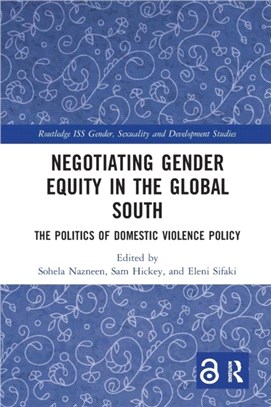定價
:NT$ 2399 元優惠價
:90 折 2159 元
無庫存,下單後進貨(到貨天數約45-60天)
下單可得紅利積點:64 點
商品簡介
相關商品
商品簡介
The Open Access version of this book, available at https://doi.org/10.4324/9781351245623, has been made available under a Creative Commons Attribution-Non Commercial-No Derivatives 4.0 license. The fact that women have achieved higher levels of political inclusion within low- and middle-income countries has generated much speculation about whether this is reaping broader benefits in tackling gender-based inequalities. This book uncovers the multiple political dynamics that influence governments to adopt and implement gender equity policies, pushing the debate beyond simply the role of women's inclusion in influencing policy.
Bringing the politics of development into discussion with feminist literature on women's empowerment, the book proposes the new concept of 'power domains' as a way to capture how inter-elite bargaining, coalitional politics, and social movement activism combine to shape policies that promote gender equity. In particular, the book investigates the conditions under which countries in sub-Saharan Africa and South Asia have adopted legislation against domestic violence, which remains widespread in many developing countries. The book demonstrates that women's presence in formal politics and policy spaces does not fully explain the pace in adopting and implementing domestic violence law.
Underlying drivers of change within broader domains of power also include the role of clientelistic politics and informal processes of bargaining, coalition-building, and persuasion; the discursive framing of gender-equitable ideas; and how transnational norms influence women's political inclusion and gender-inclusive policy outcomes. The comparative approach across Uganda, Rwanda, South Africa, Ghana, India, and Bangladesh demonstrates how advancing gender equality varies by political context and according to the interests surrounding a particular issue. Negotiating Gender Equity in the Global South will be of interest to students and scholars of gender and development, as well as to activists within governments, political parties, nongovernmental organizations, women's movements, and donor agencies, at national and international levels, who are looking to develop effective strategies for advancing gender equality.
Bringing the politics of development into discussion with feminist literature on women's empowerment, the book proposes the new concept of 'power domains' as a way to capture how inter-elite bargaining, coalitional politics, and social movement activism combine to shape policies that promote gender equity. In particular, the book investigates the conditions under which countries in sub-Saharan Africa and South Asia have adopted legislation against domestic violence, which remains widespread in many developing countries. The book demonstrates that women's presence in formal politics and policy spaces does not fully explain the pace in adopting and implementing domestic violence law.
Underlying drivers of change within broader domains of power also include the role of clientelistic politics and informal processes of bargaining, coalition-building, and persuasion; the discursive framing of gender-equitable ideas; and how transnational norms influence women's political inclusion and gender-inclusive policy outcomes. The comparative approach across Uganda, Rwanda, South Africa, Ghana, India, and Bangladesh demonstrates how advancing gender equality varies by political context and according to the interests surrounding a particular issue. Negotiating Gender Equity in the Global South will be of interest to students and scholars of gender and development, as well as to activists within governments, political parties, nongovernmental organizations, women's movements, and donor agencies, at national and international levels, who are looking to develop effective strategies for advancing gender equality.
主題書展
更多
主題書展
更多書展今日66折
您曾經瀏覽過的商品
購物須知
外文書商品之書封,為出版社提供之樣本。實際出貨商品,以出版社所提供之現有版本為主。部份書籍,因出版社供應狀況特殊,匯率將依實際狀況做調整。
無庫存之商品,在您完成訂單程序之後,將以空運的方式為你下單調貨。為了縮短等待的時間,建議您將外文書與其他商品分開下單,以獲得最快的取貨速度,平均調貨時間為1~2個月。
為了保護您的權益,「三民網路書店」提供會員七日商品鑑賞期(收到商品為起始日)。
若要辦理退貨,請在商品鑑賞期內寄回,且商品必須是全新狀態與完整包裝(商品、附件、發票、隨貨贈品等)否則恕不接受退貨。
























